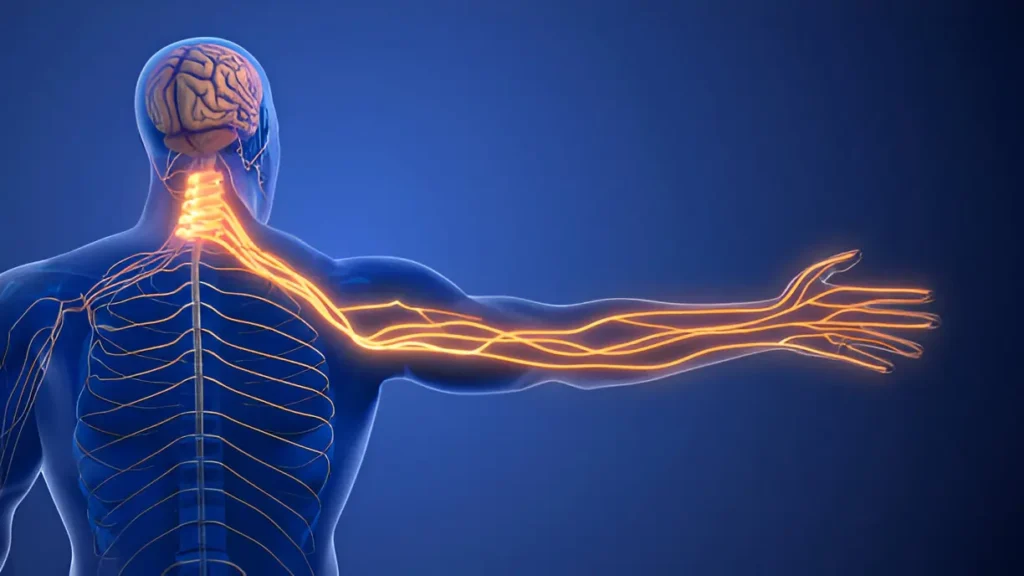Nerve pain can feel like an unrelenting storm in your body, disrupting every moment of the day. From sharp, stabbing sensations to persistent burning or tingling, it’s a condition that leaves many searching for answers. But understanding what causes nerve pain is a critical step toward finding relief and managing its impact.
What is Nerve Pain?
Nerve pain, also known as neuropathic pain, occurs when there’s damage or dysfunction in the nervous system. To understand it better, it’s helpful to first know how the nervous system works.
The Nervous System and Its Role
The nervous system is your body’s communication network, made up of two main parts:
- Central Nervous System (CNS): This includes the brain and spinal cord, serving as the control center.
- Peripheral Nervous System (PNS): These are the nerves that branch out from the CNS to the rest of your body, transmitting signals to and from muscles, skin, and organs.
Together, these systems allow you to feel sensations, like a gentle touch or sharp pain, and enable your body to respond to stimuli. When something interrupts or damages these signals, nerve pain can develop.
What Does Nerve Pain Feel Like?
Unlike typical pain from an injury or strain, nerve pain is often described as:
- Burning or electric-shock sensations
- Prickling or “pins and needles”
- Numbness or hypersensitivity in the affected area
These sensations can vary in intensity, often becoming worse at night, and don’t always correlate with visible injuries, making neuropathic pain particularly challenging to endure.
Common Causes of Nerve Pain
While nerve damage can result from a variety of sources, some causes are especially common and well-documented.
1. Diabetes
One of the leading causes globally, diabetic neuropathy affects up to 50% of people with diabetes. High blood sugar levels can damage smaller nerves in the body, especially in the hands and feet, resulting in burning, tingling, or numbness.
2. Injuries
Trauma, such as fractures, sprains, or surgical complications, may compress or sever nerves, leading to localized pain or numbness that persists even after the injury has healed.
3. Infections
Certain viral infections can directly attack the nervous system, triggering nerve pain. Examples include:
- Shingles (herpes zoster): Famous for causing post-herpetic neuralgia, an intense, lingering pain after the rash subsides.
- HIV and Lyme disease are other infections known to cause neuropathy.
4. Autoimmune Diseases
Conditions like lupus, multiple sclerosis (MS), or rheumatoid arthritis involve the immune system mistakenly attacking healthy tissues, including nerves. This results in chronic pain and mobility issues for many individuals.
Less Common Causes of Nerve Pain
While rarer, there are additional triggers to watch for when managing nerve pain.
1. Tumors
Both benign and malignant tumors can compress nearby nerves, resulting in localized nerve pain. Treatment often involves removing or shrinking the tumor to relieve pressure.
2. Vascular Malformations
Rare abnormalities in blood vessels can restrict blood flow to nerves, depriving them of essential oxygen and nutrients. Over time, this can lead to painful nerve damage.
3. Idiopathic Neuropathy
Sometimes, nerve pain occurs with no identifiable cause, leaving patients frustrated and searching for answers. This is referred to as idiopathic neuropathy and emphasizes the complexity of diagnosing nerve-related conditions.
Diagnosing Nerve Pain
Identifying the root cause of nerve pain begins with thorough evaluations by a healthcare professional. While self-diagnosis is tempting, it’s essential to rely on medical tests to uncover the true source.
Tools Commonly Used in Diagnosis:
- Physical Exams: Checking for muscle strength, reflexes, and sensory responses.
- Blood Tests: Assessing for diabetes, vitamin deficiencies, or autoimmune markers.
- Imaging Tests: MRI or CT scans can detect physical damage, tumors, or compressed nerves.
- Electromyography (EMG) & Nerve Conduction Studies: These measure how well electrical signals pass through nerves, pinpointing dysfunction or damage.
Treatment Options
Once the cause of nerve pain is established, treatment can be tailored to address underlying factors and alleviate symptoms. For the best results, a multi-faceted approach combining medications, therapies, and lifestyle adjustments is typically recommended.
Medications
- Pain Relievers: Over-the-counter options like ibuprofen or acetaminophen can help with mild cases, while prescription options like gabapentin target neuropathic pain.
- Antidepressants & Anti-Seizure Drugs: These are often used “off-label” for their ability to calm overactive nerve signals.
Physical Therapy
Therapeutic exercises can help restore mobility, strengthen muscles, and reduce reliance on medications.
Lifestyle Changes
Sometimes, managing nerve pain is about fostering long-term health:
- Exercise regularly but gently to promote circulation and reduce inflammation.
- Maintain a balanced diet that supports nerve health, emphasizing fruits, vegetables, and whole grains.
- Ensure proper sleep, reducing overnight pain flare-ups.
Alternative Therapies
Acupuncture, massage therapy, or even mindfulness meditation have shown promising results for some individuals. These methods can complement traditional care, helping to manage both physical and emotional pain.
Advanced Treatment
For severe cases, specialists, like those in Tulsa, may recommend neuropathy treatments, nerve blocks, or spinal cord stimulation, depending on the diagnosis. Always consult with a professional before pursuing these options.
Conclusion
Nerve pain isn’t just physical discomfort; it’s a condition that can take an emotional and psychological toll. The importance of understanding and addressing its root causes cannot be overstated. With accurate diagnoses and a combination of treatments—from expert-guided physical therapy to sustainable lifestyle changes—you can regain control and reduce its impact on your daily life.
Read more: Creative Springtime Ideas to Surprise Your Loved Ones


